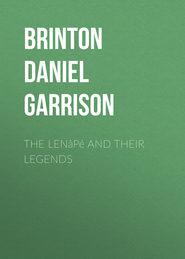По всем вопросам обращайтесь на: info@litportal.ru
(©) 2003-2024.
✖
The Philosophic Grammar of American Languages, as Set Forth by Wilhelm von Humboldt
Настройки чтения
Размер шрифта
Высота строк
Поля
By the subjective roots, Humboldt meant the personal pronouns. To these he attributed great importance in the development of language, and especially of American languages. They carry with them the mark of sharp individuality, and express in its highest reality the notion of Being.
It is not easy to understand Humboldt’s theory of the evolution of the personal pronouns. In his various essays he seems to offer conflicting statements. In one of his later papers, he argues that the origin of such subjective nominals is often, perhaps generally, locative. By comparing the personal pronouns with the adverbs of place in a series of languages, he showed that their demonstrative antedated their personal meaning.[25 - Ueber die Verwandtschaft der Ortsadverbia mit dem Pronomen in einigen Sprachen, in the Abhandlungen der hist. – phil. Classe der Berliner Akad. der Wiss. 1829.] With regard to their relative development, he says, in his celebrated “Introduction”:
“The first person expresses the individuality of the speaker, who is in immediate contact with external nature, and must distinguish himself from it in his speech. But in the ‘I’ the ‘Thou’ is assumed; and from the antithesis thus formed is developed the third person.”[26 - Ueber die Verschiedenheit, etc., Bd. vi, s. 115.]
But in his “Notice of the Japanese Grammar of Father Oyanguren,” published in 1826, he points out that infants begin by speaking of themselves in the third person, showing that this comes first in the order of knowledge. It is followed by the second person, which separates one object from others; but as it does so by putting it in conscious antithesis to the speaker, it finally develops the “I.”[27 - Gesammelte Werke, Bd. vii, ss. 392-6.]
The latter is unquestionably the correct statement so far as the history of language is concerned and the progress of knowledge. I can know myself only through knowing others.
The explanation which reconciles these theories is that the one refers to the order of thought, or logical precedence, the other to the order of expression. Professor Ferrier, in his “Institutes of Metaphysics,” has established with much acuteness the thesis that, “What is first in the order of nature is last in the order of knowledge,” and this is an instance of that philosophical principle.
§ 7. Formal and Material Elements of Language
A fundamental distinction in philosophic grammar is that which divides the formal from the material element of speech. This division arises from the original double nature of each radical, as expressing both Being and Action.
On the one hand, Action involves Relation; it assumes an object and a subject, an agent, a direction of effort, a result of effort; usually also limitations of effort, time and space, and qualifications as to the manner of the effort. In other words, Action is capable of increase or decrease both in extension and intension.
On the other hand, Being is a conception of fixed conditions, and is capable of few or no modifications.
The formal elements of a language are those which express Action, or the relation of the ideas; they make up the affixes of conjugations and declensions, the inflections of words; they indicate the parts of speech, the so-called “grammatical categories,” found in developed tongues. The material elements are the roots or stems expressing the naked ideas, the conceptions of existence apart from relation.
Using the terms in this sense, Humboldt presents the following terse formula, as his definition of Inflection: “Inflection is the expression of the category in contrast to the definition of the idea.”[28 - His explanation of inflection is most fully given in his Introductory Essay, Ueber die Verschiedenheit, etc., § 14, Gesammelte Werke, s. 121, sqq. A sharp, but friendly criticism of this central point of his linguistic philosophy may be found in Steinthal, Charakteristik der Hauptsächlichsten Typen des Sprachbones, ss. 58-61. Humboldt certainly appears not only obscure in parts but contradictory.] Nothing could be more definitive and lucid than this concise phrase.
The inflectional or formal elements of language are usually derived from words expressing accessory ideas. Generally, they are worn down to single letters or a single syllable, and they usually may be traced back to auxiliary verbs and pronouns.
Often various accessories are found which are not required by the main proposition. This is a common fault in the narratives of ignorant men and in languages and dialects of a lower grade. It is seen in the multiplication of auxiliaries and qualifying particles observed in many American languages, where a vast number of needless accessories are brought into every sentence.
The nature of the relations expressed by inflections may be manifold, and it is one of the tasks of philosophic grammar to analyze and classify them with reference to the direction of mental action they imply.
It is evident that where these relations are varied and numerous, the language gains greatly in picturesqueness and force, and thus reacts with a more stimulating effect on the mind.
§ 8. The Development of Languages
Humboldt believed that in this respect languages could be divided into three classes, each representing a stage in progressive development.
In the first and lowest stage all the elements are material and significant, and there are no true formal parts of speech.
Next above this is where the elements of relation lose their independent significance where so used, but retain it elsewhere. The words are not yet fixed in grammatical categories. There is no distinction between verbs and nouns except in use. The plural conveys the idea of many, but the singular not strictly that of unity.
Highest of all is that condition of language where every word is subject to grammatical law and shows by its form what category it comes under; and where the relational or formal elements convey no hint of anything but this relation. Here, only, does language attain to that specialization of parts where each element subserves its own purpose and no other, and here only does it correspond with clear and connected thinking.
These expressions, however, must not be understood in a genetic sense, as if historically one linguistic class had preceded the other, and led up to it. Humboldt entertained no such view. He distinctly repudiated it. He did not believe in the evolution of languages. The differences of these classes are far more radical than that of sounds and signs; they reach down to the fundamental notions of things. His teaching was that a language without a passive voice, or without a grammatical gender can never acquire one, and consequently it can never perfectly express the conceptions corresponding to these features.[29 - See these teachings clearly set forth in his Essay, Ueber das vergleichende Sprachstudium in Beziehung auf die verschiedenen Epochen der Sprachentwicklung, Werke, Bd. iii, especially, s. 255 and s. 262.]
In defining and appraising these inherent and inalienable qualities of languages lies the highest end and aim of linguistic science. This is its true philosophic character, its mission which lifts it above the mere collecting of words and formulating of rules.
If the higher languages did not develop from the lower, how did they arise? Humboldt answered this question fairly, so far as he was concerned. He said, he did not know. Individuals vary exceedingly in their talent for language, and so do nations. He was willing to call it an innate creative genius which endowed our Aryan forefathers with a richly inflected speech; but it was so contrary to the results of his prolonged and profound study of languages to believe, for instance, that a tongue like the Sanscrit could ever be developed from one like the Chinese, that he frankly said that he would rather accept at once the doctrine of those who attribute the different idioms of men to an immediate revelation from God.[30 - The eloquent and extraordinary passage in which these opinions are expressed is in his Lettre à M. Abel-Remusat, Gesammelte Werke, Bd. vii, ss. 336-7.]
He fully recognized, however, a progress, an organic growth, in human speech, and he expressly names this as a special branch of linguistic investigation.[31 - Gesammelte Werke, Bd. iii, ss. 248, 257.] He lays down that this growth may be from two sources, one the cultivation of a tongue within the nation by enriching its vocabulary, separating and classifying its elements, fixing its expressions, and thus adapting it to wider uses; the second, by forcible amalgamation with another tongue.
The latter exerts always a more profound and often a more beneficial influence. The organism of both tongues may be destroyed, but the dissolvent force is also an organic and vital one, and from the ruins of both constructs a speech of grander plans and with wider views. “The seemingly aimless and confused interminglings of primitive tribes sowed the seed for the flowers of speech and song which flourished in centuries long posterior.”
The immediate causes of the improvement of a language through forcible admixture with another, are: that it is obliged to drop all unneccessary accessory elements in a proposition; that the relations of ideas must be expressed by conventional and not significant syllables; and that the limitations of thought imposed by the genius of the language are violently broken down, and the mind is thus given wider play for its faculties.
Such influences, however, do not act in accordance with fixed laws of growth. There are no such laws, which are of universal application. The development of the Mongolian or Aryan tongues is not at all that of the American. The goal is one and the same, but the paths to it are infinite. For this reason each group or class of languages must be studied by itself, and its own peculiar developmental laws be ascertained by searching its history.[32 - This reasoning is developed in the essay, Ueber das Vergleichende Sprachstudium, etc., Gesammelte Werke, Bd. iii, ss. 241-268; and see ibid, s. 270.]
With reference to the growth of American languages, it was Humboldt’s view that they manifest the utmost refractoriness both to external influence and to internal modifications. They reveal a marvellous tenacity of traditional words and forms, not only in dialects, but even in particular classes of the community, men having different expressions from women, the old from the young, the higher from the lower classes. These are maintained with scrupulous exactitude through generations, and except by the introduction of words, three centuries of daily commingling with the white race, have not at all altered the grammer and scarcely the phonetics of many of their languages.
Nor is this referable to the contrast between an Aryan and an American language. The same immiscibility is shown between themselves. “Even where many radically different languages are located closely together, as in Mexico, I have not found a single example where one exercised a constructive or formative influence on the other. But it is by the encounter of great and contrasted differences that languages gain strength, riches, and completeness. Only thus are the perceptive powers, the imagination and the feelings impelled to enrich and extend the means of expression, which, if left to the labors of the understanding alone, are liable to be but meagre and arid.”[33 - See the essay Ueber die Buchstabenschrift und ihren Zusammenhang mit dem Sprachbau, Ges. Werke, Bd. vi, ss. 551-2.]
§ 9. Internal Form of Languages
Besides the grammatical form of a language, Humboldt recognized another which he called its internal form. This is that subtle something not expressed in words, which even more than the formal parts of speech, reveals the linguistic genius of a nation. It may be defined as the impression which the language bears of the clearness of the conceptions of those speaking it, and of their native gift of speech. He illustrates it by instancing the absence of a developed mode in Sanscrit, and maintains that in the creators of that tongue the conception of modality was never truly felt and distinguished from tense. In this respect its inner form was greatly inferior to the Greek, in the mind of which nation the ideally perfect construction of the verb unfolded itself with far more clearness.
The study of this inner form of a language belongs to the highest realm of linguistic investigation, and is that which throws the most light on the national character and capacities.[34 - On this subtle point, which has been by no means the least difficult to his commentators, see Humboldt’s Introduction Ueber die Verschiedenheit, etc., Ges. Werke, Bd. vi, ss. 45-6, 92-5, 254-5, by a careful comparison of which passages his real intent will become apparent.]
§ 10. Criteria of Rank in Languages
Humboldt’s one criterion of a language was its tendncy to quicken and stimulate mental action. He maintained that this is secured just in proportion as the grammatical structure favors clear definition of the individual idea apart from its relations, in other words, as it separates the material from the inflectional elements of speech. Clear thinking, he argued, means progressive thinking. Therefore he assigned a lower position both to those tongues which inseparably connect the idea with its relations, as the American languages, and to those which, like the Chinese and in a less degree the modern English, have scarcely any formal elements at all, but depend upon the position of words (placement) to signify their relations.
But he greatly modified this unfavorable judgment by several extenuating considerations.
Thus he warns us that it is of importance to recognize fully “that grammatical principles dwell rather in the mind of the speaker than in the material and mechanism of his language.”[35 - Lettre à M. Abbe-Remusat, Ges. Werke, Bd. vii, s. 396.]
This led him to establish a distinction between explicit grammar, where the relations are fully expressed in speech, and implicit grammar, where they are wholly or in part left to be understood by the mind.
He expressly and repeatedly states that an intelligent thinker, trained in the grammatical distinctions of a higher language, can express any thought he has in the grammar of any other tongue which he masters, no matter how rude it is. This adaptability lies in the nature of speech in general. A language is an instrument, the use of which depends entirely on the skill of him who handles it. It is doubtful whether such imported forms and thoughts appeal in any direct sense to those who are native to the tongue. But the fact remains that the forms of the most barbarous languages are such that they may be developed to admit the expression of any kind of idea.
But the meaning of this must not be misconstrued. If languages were merely dead instruments which we use to work with, then one would be as good as another to him who had learned it. But this is not the case. Speech is a living, physiological function, and, like any other function, is most invigorating and vitalizing when it works in the utmost harmony with the other functions. Its special relationship is to that brain-action which we call thinking; and entire harmony between the two is only present when the form, structure and sounds of speech correspond accurately to the logical procedure of thought. This he considered “an undeniable fact.”
The measure of the excellence of a language, therefore, is the clearness, definiteness and energy of the ideas which it awakes in the nation. Does it inspire and incite their mind? Has it positive and clear tones, and do these define sharply the ideas they represent, without needless accessories? Does its structure present the leading elements of the proposition in their simplicity, and permit the secondary elements to be grouped around them in subordinate positions, with a correct sense of linguistic perspective? The answers to these queries decide its position in the hierarchy of tongues.[36 - “Nicht was in einer Sprache ausgedrückt zu werden vermag, sondern das, wozu sie aus eigner, innerer Kraft anfeuert und begeistert, entscheidet über ihre Vorzüge oder Mängel.” Ueber das Entstehen der Grammatischen Formen, etc, Werke, Bd. iii, s. 272. Compare with this the expression in his celebrated Einleitung: “Die Sprache ist das bildende Organ des Gedanken,” Werke, Bd. vi, s. 51. A perfected language will “allseitig und harmonisch durch sich selbst auf den Geist einwirken.” Ibid, s. 311.]
As its capacity for expression is no criterion of a language, still less is the abundance or regularity of its forms. For this very multiplicity, this excessive superfluity, is a burden and a drawback, and obscures the integration of the thought by attaching to it a quantity of needless qualifications. Thus, in the language of the Abipones, the pronoun is different as the person spoken of is conceived as present, absent, sitting, walking, lying, or running, all quite unnecessary specifications.[37 - Ueber das Entstehen der grammatischen Formen,“ etc., Werke, Bd. iii, s. 292.]
In some languages much appears as form which, on close scrutiny, is nothing of the kind.
This misunderstanding has reigned almost universally in the treatment of American tongues. The grammars which have been written upon them proceed generally on the principles of Latin, and apply a series of grammatical names to the forms explained, entirely inappropriate to them and misleading. Our first duty in taking up such a grammar as, for instance, that of an American language, is to dismiss the whole of the arrangement of the “parts of speech,” and, by an analysis of words and phrases, to ascertain by what arrangement of elements they express logical, significant relations.[38 - Speaking of such “imperfect” languages, he gives the following wise suggestion for their study: “Ihr einfaches Geheimniss, welches den Weg anzeigt, auf welchem man sie, mit gänzlicher Vergessenheit unserer Grammatik, immer zuerst zu enträthseln versuchen muss, ist, das in sich Bedeutende unmittelbar an einander zu reihen.” Ueber das Vergleichende Sprachstudium, etc., Werke, Bd. iii, s. 255; and for a practical illustration of his method, see the essay, Ueber das Entstehen der grammatischen Formen, etc., Bd. iii, s. 274.]
For example, in the Carib tongue, the grammars give aveiridaco as the second person singular, subjunctive imperfect, “if thou wert.” Analyze this, and we discover that a is the possessive pronoun “thy;” veiri is “to be” or “being” (in a place); and daco is a particle of definite time. Hence, the literal rendering is “on the day of thy being.” The so-called imperfect subjunctive turns out to be a verbal noun with a preposition. In many American languages the hypothetical supposition expressed in the Latin subjunctive is indicated by the same circumlocution.
Again, the infinitive, in its classical sense, is unknown in most, probably in all, American languages. In the Tupi of Brazil and frequently elsewhere it is simply a noun; caru is both “to eat” and “food;” che caru ai-pota, “I wish to eat,” literally “my food I wish.”
In the Mexican, the infinitive is incorporated in the verb as an accusative, and the verb is put in the future of the person spoken of.
Many writers continue to maintain that a criterion of rank of a language is its lexicographical richness – the number of words it possesses. Even very recently, Prof. Max Müller has applied such a test to American languages, and, finding that one of the Fuegian dialects is reported to have nearly thirty thousand words, he maintains that this is a proof that these savages are a degenerate remnant of some much more highly developed ancestry. Founding his opinion largely on similar facts, Alexander von Humboldt applied the expression to the American nations that they are “des débris échappés à un naufrage commun.”
Such, however, was not the opinion of his brother Wilhelm. He sounded the depths of linguistic philosophy far more deeply than to accept mere abundance of words as proof of richness in a language. Many savage languages have twenty words signifying to eat particular things, but no word meaning “to eat” in general; the Eskimo language has different words for fishing for each kind of fish, but no word “to fish,” in a general sense. Such apparent richness is, in fact, actual poverty.
Humboldt taught that the quality, not merely the quantity, of words was the decisive measure of verbal wealth. Such quality depends on the relations of concrete words, on the one hand, to the primitive objective perceptions at their root, and, on the other, to the abstract general ideas of which they are particular representatives; and besides this, on the relations which the spoken word, the articulate sound, bears to the philosophic laws of the formation of language in general.[39 - His teachings on this point, of which I give the barest outline, are developed in sections 12 and 13 of his Introduction, Ueber die Verschiedenheit, etc. Steinthal’s critical remarks on these sections (in his Charakteristik der haupt. Typen des Sprachbaues) seem to me unsatisfactory, and he even does not appear to grasp the chain of Humboldt’s reasoning.]











